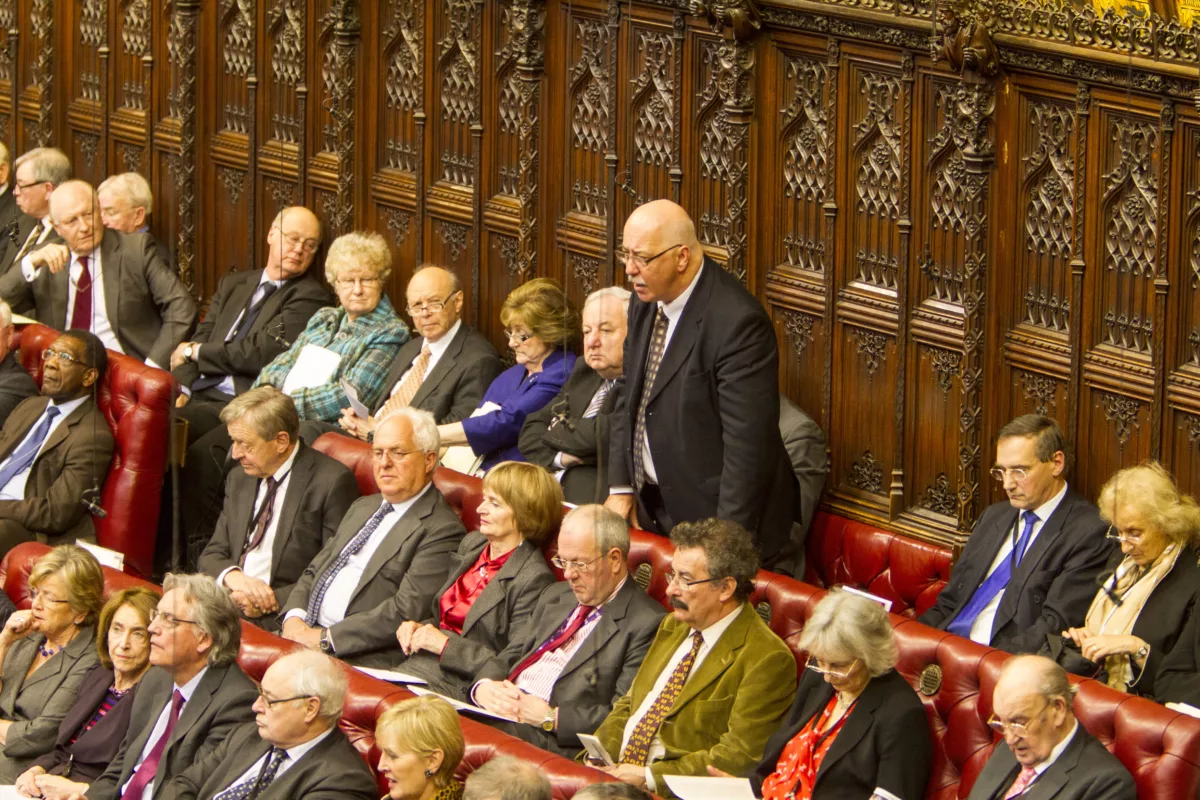
Humanists UK is deeply saddened by the death of Labour peer Lord Lyndon Harrison, Humanists UK patron and stalwart member of the All-Party Parliamentary Humanist Group (APPHG) until his retirement from the House of Lords.
Lord Harrison was one of the most active humanists in Parliament in the 2000s and 2010s, making huge contributions to humanist marriages, the question of religion in Parliament, and recognition of humanism in society.
Born in 1947, Lord Harrison studied at the University of Warwick, University of Sussex, and University of Keele, where he earned multiple degrees in the arts and humanities. His career in public service began in earnest when he became a Member of the European Parliament (MEP) in 1989. A decade later, in 1999, he was made a Labour life peer, taking his seat in the House of Lords.
A proud humanist and an active member of the APPHG from his position in the House of Lords, Lord Harrison sought throughout his career to make sure that the voices of the non-religious were heard, valued, and respected in public life. In 2007, he initiated a debate in the House of Lords on ‘the position in British society of those who profess no religion’, challenging the contemporary narrative that non-religious people, including humanists, were ‘illiberal’ or ‘aggressive.’ He called for greater recognition of the non-religious in the formation of public policy and for equality in public life.
‘My debate today seeks to… tabulate those areas of public life where we feel unacknowledged, unprized, and under-represented. I hope, too, to ponder on what government and the wider community might do to reflect better this modern and more secular Britain that is developing, in particular in its public policies and institutions.’
He was praised by Lord Judd in this same debate for his ‘warm engagement with the realities of society’ and knowing ‘what really makes society, at the grassroots, tick.’ ‘It is always good’, he added, ‘that he challenges us [the Lords] with those perceptions.’
In 2013 he organised a second such debate, this time more specifically to celebrate the contribution of humanists to British society and highlight the work of Humanists UK:
‘My Lords, today we speak up on behalf of the silent majority, for those of us who do not attend any place of worship, whether church, mosque or synagogue. It is a silent majority, whose full contribution to British society has perhaps been unsung for too long. In contrast, we find that religious voices are ever more present, and sometimes shrill, in the public square. However, because atheism is a philosophical viewpoint, arrived at individually and personally, we are not given to marching in the street chanting, “What do we want? Atheism! When do we want it? Now!”. As a humanist who senses that religion has neither rhyme nor reason, I believe that we should ensure that our needs and concerns are met and satisfied in that public square, as they are in the private armchair. For too long we have been silent, contemplative hermits in terms of our own cause.’
In 2010 he organised a debate on religious exemptions from equality laws and on secularism, prompted by Humanists UK reports on the matter.
‘I believe that the time has come for a secular state within an open society – an idea which has the support of many humanists and many among the Anglican Communion… [Humanists UK’s] case for secularism argues that we can no longer base society on a shared religion, but rather on shared values. A secular state, which is most avowedly not an atheist state, seeks to protect the rights of all citizens to hold their own beliefs, religious or otherwise. A secular state is assuredly an open and an even-handed state in which people’s participation in public institutions does not depend on their religious or non-religious convictions.’
In 2012 he introduced the first-ever private members’ bill to bring about legal recognition of humanist marriages. This kickstarted all subsequent parliamentary debate on the issue. In 2013, when the Same-Sex Marriage Act was going through Parliament, he was the first in the Lords to put down amendments to add humanist marriage recognition to that Bill. His and others’ efforts were rewarded when the Government subsequently introduced its own amendment to bring about recognition – although one it has sadly subsequently resisted enacting.
He was actively involved in debates around religion, humanism, and education. For example, he spoke out in support of humanism in RE, against 100% selective religious schools, and on school admissions rules. He also organised an oral question on whether the BBC was including humanists enough in its coverage.
Outside of parliamentary life, Lord Harrison remained a keen advocate for the inclusion of the non-religious in public life, debating prominent figures like conservative commentator Peter Hitchens on BBC Radio 4’s Today programme on whether religious people have a privileged position in society.
Commenting on Lord Harrison’s death, Andrew Copson said:
‘I worked with Lyndon for twenty years and he was always a warm and incisive colleague. He leaves behind a huge legacy of principled advocacy for humanism and the fair representation of non-religious voices in the UK. At Humanists UK we will all miss him very much and we extend our heartfelt condolences to his family and friends and the many who loved him.’
Notes
For further comment or information, media should contact Humanists UK Director of Public Affairs and Policy Richy Thompson at press@humanists.uk or phone 0203 675 0959.
Humanists UK is the national charity working on behalf of non-religious people. Powered by over 120,000 members and supporters, we advance free thinking and promote humanism to create a tolerant society where rational thinking and kindness prevail. We provide ceremonies, pastoral care, education, and support services benefitting over a million people every year and our campaigns advance humanist thinking on ethical issues, human rights, and equal treatment for all.
